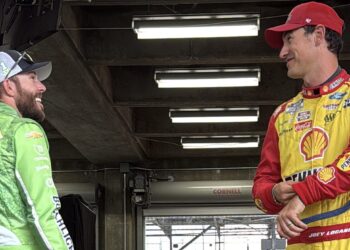Denny Hamlin has never been afraid to speak his mind when it comes to NASCAR’s rules, format, or the way the sport charts its future. Now, the veteran driver and co-owner of 23XI Racing is throwing his considerable influence behind a dramatic proposal that could fundamentally alter how the NASCAR Cup Series champion is crowned each year — a system that has been both thrilling and controversial since its inception.
The current playoff format, introduced in 2004 and tweaked several times since, has always been divisive among fans and drivers alike. The “Championship 4” system, where four drivers advance to a winner-take-all finale at Phoenix Raceway, means that after 35 grueling races, it all comes down to a single showdown. One bad pit stop, one fluke mechanical failure, or getting caught up in someone else’s wreck can erase an entire season of dominance in an instant.
Hamlin, who has come agonizingly close to capturing his first Cup title under this system, knows that pain well. Despite being one of NASCAR’s most consistent and successful drivers for nearly two decades, the elusive championship trophy has slipped through his fingers time and again. His own near-misses have shaped his view of what NASCAR could do better.
Recently on his “Actions Detrimental” podcast — where Hamlin often provides an unfiltered look behind the curtain of the sport — he floated support for a massive overhaul: replacing the one-race championship with a more balanced multi-race format, or even reverting to a points-based system that rewards consistency across the full season or the final playoff stretch.
Hamlin argued that the current format is too much of a lottery, failing to truly reward the best overall team and driver combination. He’s not alone. Many purists have long believed that the old season-long points system, which crowned champions like Richard Petty, Dale Earnhardt, and Jeff Gordon, gave a more accurate reflection of sustained excellence.
Under Hamlin’s vision, NASCAR would introduce either a best-of-three or best-of-five final round to decide the champion, or extend the significance of points in the final ten races. This way, one fluke wouldn’t derail a dominant driver’s championship hopes. The change would also bring NASCAR closer to the format used in other major American sports like the NBA and MLB, where champions are decided over a series rather than a single game.
Critics of the current system — and there are plenty — point to examples like Kevin Harvick in 2020, who won nine races and dominated the season only to miss the Championship 4 due to a bad finish at Martinsville. Meanwhile, a driver with fewer wins but a good day at Phoenix can walk away with the title. It’s dramatic, no doubt, but is it fair?
Hamlin’s willingness to publicly back this idea carries weight. As an active driver and influential team owner, he bridges the old guard and the next generation. His voice resonates not just with frustrated fans but with NASCAR leadership, sponsors, and the garage area. For NASCAR, any talk of changing the playoff format is delicate. The “Game 7” feel of the current finale is a TV ratings goldmine. Broadcasters love the drama, and so do some fans who crave an all-or-nothing spectacle.
Yet the sport faces a delicate balance. It must maintain excitement for casual viewers while respecting the legitimacy that loyal fans — and drivers — crave. Hamlin’s push for change taps into that tension. If the sport’s top stars are openly questioning the format’s fairness, it’s only a matter of time before the conversation reaches the boardrooms in Daytona Beach.
Some insiders believe a compromise could emerge: keeping the playoffs and eliminations but tweaking the final round. For example, a three-race “Championship Round” could rotate among iconic tracks like Martinsville, Darlington, and Phoenix. The driver with the best cumulative finish or points across those races would win the championship. Such a format would preserve the intensity of the playoffs while minimizing the “bad luck” factor.
Hamlin’s broader point is simple — NASCAR should not fear evolution. The sport’s roots are built on adapting to changing times. If the goal is to determine the most deserving champion, he argues, it must be done in a way that balances spectacle and sporting integrity. For a driver who’s felt the sting of the current system’s ruthless nature, the argument carries a deeply personal tone.
Whether NASCAR’s brass is ready to listen remains to be seen. Changing the playoff format is a massive undertaking involving TV contracts, sponsor agreements, and decades of tradition. But as Denny Hamlin keeps proving — on the track and behind the microphone — the conversation is far from over.
If the day comes when the Cup Series champion is crowned through a series of races instead of a single winner-takes-all shootout, history might remember Denny Hamlin not just as one of the best drivers to never win a title — but as the man who helped make sure the
best driver finally does.











